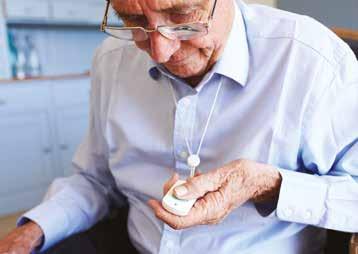
9 minute read
Helping you to stay independent
Services developed in partnership with the voluntary sector
Adult Social Care works with voluntary and community organisations to supply preventative care services. These are a vital form of support and help to maintain independence and social inclusion, and delay or avoid the need for more statutory interventions.
Examples include: • day services, lunch clubs and social groups; • befriending, visiting and telephone contact services; • support schemes to help people being discharged from hospital; • support for carers; and • handyperson schemes.
Day care centres
Many people can feel lonely or isolated without an opportunity to fill their days with meaningful activities. Research has shown that one way to alleviate loneliness and promote wellbeing and independence is to provide regular social contact and a focus for activities.
Day care centres give people the chance to change their routine, meet new people, take up an activity or receive specialist services such as chiropody or hairdressing. There is a wide variety around the county, catering for older people, people with mental health conditions, learning disabilities and dementia.
Centres can be as important for carers as those attending as they allow for a regular break from caring. Visit www.warwickshire.gov.uk/daycentres for information about opportunities in Warwickshire.
Meals on wheels
Some services can deliver frozen or freshly cooked meals to your home. Frozen meals can be delivered in bulk and kept in your freezer until required, while hot meals should be eaten immediately.
Councils may be able to arrange meals delivered to your door, though you would have to meet their eligibility criteria and it may not be free. National and local commercial organisations can also provide meals delivered to your door at a charge. You may find a service by word of mouth or using the internet – your local library may be able to help here – see page 62 for contact details.
Alternatively, your local authority may have details on their website. Contact details are on page 5.
Adapting your home
To remain in your own home for as long as you would like, you should ensure that it is safe, secure and warm. Some forward planning to ensure that the garden doesn’t become a burden is also sensible. If you are not planning to move, think about adaptations that would make life easier now and later on.
Home Improvement Agencies (HIAs)
HIAs are local organisations funded and supported by local and central Government. They work professionally and sensitively with older and disabled homeowners, providing advice, support and assistance to help them repair, improve, maintain or adapt their homes to meet their changing needs.
Most HIAs provide three main services, including: information and advice on repairs or adaptations you may be considering – this usually entails a visit to your home and is often free; a handyperson
service for small jobs and repairs – typically, the HIA will employ its own handypersons and charge you an hourly rate for their services; and a home adaptations service for more major works.
The HIA will work with you to specify the adaptations needed, and they will normally offer to get estimates from one or more of their regular contractors. Subject to your acceptance, the HIA will then offer to manage the works contract for you for an agreed fee.
HIAs may also be helpful if you are not sure whether you can afford the home repairs or adaptations you need. They can advise on your eligibility for any grants and, if necessary, put you in touch with an independent financial adviser. For further information about, and contact details for, local HIAs, visit www.housingcare.org or contact your local council – details are on page 5.
HEART Partnership
Operating across Warwickshire, the partnership offers practical advice and information about aids to help you at home, housing safety matters and benefits, grants or loans for essential building works, and more. The partnership can also deliver home improvements and adaptations to suit a diverse range of needs. Web: www.nuneatonandbedworth.gov.uk (search ‘HEART Partnership’).
HEART North
For residents of North Warwickshire, Nuneaton and Bedworth and Rugby Borough Councils. Tel: 0247 637 6294 Email:
HEARTnorth@nuneatonandbedworth.gov.uk
HEART South
For residents of Warwick and Stratford-on-Avon District Councils. Tel: 0247 637 6299 Email:
HEARTsouth@nuneatonandbedworth.gov.uk
Search for care in your area
www.carechoices.co.uk
• Find care providers quickly and easily • Search by location and care need • Information on care quality • Links to inspection reports • Additional information, photos and web links • Brochure requests
If you’re having difficulties with everyday tasks at home, these simple solutions could make life easier and keep you independent. These are a starting point; other solutions are available which might better suit your needs.
Finding it difficult to get in and out of chairs? Try putting a piece of hard board under the seat base. Alternatively, buy chair raisers, a higher chair or an electric riser chair. Also try taking regular gentle exercise to improve your mobility.
If you can’t reach your windows, could you move furniture out of the way? Ask someone to help if you need to move heavy furniture. There are also tools for opening and closing windows.
Struggling to keep warm/cool? Consider a fan or heater. Is your house insulated? Are there any draughts? You may also be eligible for the winter fuel payment from the Government. Visit
www.gov.uk/winter-fuel-payment
If you have trouble using light switches, think about replacing your switches for ones that are easier to use. Consider handi-plugs or light switch toggles, or there’s even technology available so that you can turn your lights on and off using your speech.
Use subtitles if you can’t hear the TV or buy wireless headphones. Do you need a hearing aid? Request an assessment from your council. Do you forget to take your tablets? Try making a note of when you’ve taken them, or buy an automatic pill dispenser or pill box. If you struggle to open your medicine, you can ask your pharmacist for advice on alternative packaging that could make it easier for you.
Can you reach everything in your cupboards? If not, try a handi-reacher or rearrange your kitchen so the things you use most are within easy reach.
If you are having problems with preparing food, consider buying ready-chopped options or try a chopping board with spikes. There are also longhandled pans, teapot tippers and lid grippers that could help. Palm-held vegetable peelers or a food processor might be a solution and meal delivery services are also available.
Is eating and drinking becoming difficult? Large-handled cutlery could help, or non-slip mats for the table. Lightweight cups and mugs with two handles could also be a solution.
Using taps can be made easier by fitting tap turners. You could also consider changing to leverstyle taps which might be easier for you to use.
More information on staying independent and ideas to help you live at home can be found online at www.carechoices.co.uk/staying-independent-at-home/ There is also information on making larger adaptations to your home.
If moving whilst in bed is a problem, have you thought about using an over-bed pole? You might also want to buy a pillow raiser or change your bedding so it’s lighter.
Is it becoming difficult to get dressed? If so, specially adapted clothing is available, or you could buy a long-handled shoe horn, a dressing stick or a button hook. If you are having a lot of difficulty, consider home support, see page 16.
Clocks are available with large numbers or lights if you can’t read the time in bed. You can also buy clocks that speak the time.
If you are finding it harder to read in bed, consider an e-reader that allows you to change the font size. Some also have integrated lights. Look for bedside lamps with a step-on or button switch if yours are difficult to use.
Do you struggle to get in and out of bed? You could learn new ways of moving around, purchase a leg lifter or a hoist or install grab rails for support. Seek advice about these options. If the bed is the issue, you could buy an electric adjustable bed or raise the bed to the right height. If it’s hard to hold your toothbrush, try a toothbrush gripper. You might also benefit from having an electric toothbrush or sitting on a stool while brushing your teeth.
You might like to buy a raised toilet seat, or a seat with a built-in support frame if it’s hard to use your toilet. Flush lever extensions are also available.
Has it become more difficult to wash? Items are available, like long-handled sponges and flannel straps. You could also consider a slip-resistant bath mat, grab rails, a half step to help you get in and out of the bath or a bath or shower seat. Tap turners can also be used in the bathroom.
For more information on technology that could make your life easier, contact your council for an assessment. They might refer you to an occupational therapist (OT) or you could contact an OT privately. Search online for OTs near you.
Warwickshire County Council
Tel: 01926 410410 / 01926 886922 (emergency duty team). Web: www.warwickshire.gov.uk/
supportforadults
There is a range of equipment available to make life easier and to improve safety and independence in the home, such as stair rails, raised toilet seats and shower stools. These items are often referred to as ‘simple aids for daily living’.
The Disabled Living Foundation (DLF) provides a quick and easy-to-use online guided advice service called AskSARA, which can help anyone who finds that they have difficulties with everyday tasks.
Visit https://asksara.livingmadeeasy.org.uk to explore possible solutions or see pages 8 to 9. Once you have identified equipment that might help with your support needs, use the checklist on page 11 to make sure it’s right for you.

Telecare
Telecare is equipment that can detect falls, inactivity, smoke, flooding, gas or extreme temperatures in the home. Sensors, when activated, will connect to a response centre where trained operators will contact the individual through their home unit. They will take the most appropriate action, such as contacting a nominated responder, family member, carer, neighbour, doctor or the emergency services.
Telecare can allow users to regain confidence in their homes and remain independent. Relatives and carers are also reassured, safe in the knowledge that should an incident occur, they will know about it. Some devices can also help monitor particular health conditions and reduce the need for hospital admission.
You can buy telecare and assistive technology from private companies and organisations or, if you’re eligible through an assessment (see page 12), your local council may be able to provide it for you. For further information, please visit your council’s website – details are on page 5.
Local telecare providers Independent Living Team
Stratford-on-Avon District Council. Tel: 01789 260848 Email: independentliving@stratford-dc.gov.uk
Lifeline Independent Living Service
Rugby Borough Council. Tel: 01788 579706 Email: home@rugby.gov.uk
Lifeline Services
Warwick District Council and North Warwickshire Borough Council. Tel: 01926 339577 Email: lifelineservices@warwickdc.gov.uk
Milbrook Healthcare
Warwickshire County Council. Tel: 0333 321 8986 Email: warwickshirecontactus@
millbrookhealthcare.co.uk
Search for care in your area
www.carechoices.co.uk
With so many providers to choose from, where do you start?
• Find care providers quickly and easily • Search by location and care need • Information on care quality • Links to inspection reports • Additional information, photos and web links • Brochure requests







